#and today is the date of holocaust remembrance
Explore tagged Tumblr posts
Text
A rant about US-centrism
Why do so many Americans on Tiktok think that the huge protests here in Germany are for them?? Like I fully get that the situation with Trump rn is horrifying and everyone who knows history is and should be rightfully worried. And I try to spread information about ICE raids and stuff like that because I care about people everywhere in the world.
But seeing Americans on tiktok saying "thank you for protesting FOR US" is absolutely crazy, the USA centrism is insane!!! (Especially because I don't really see many Americans share much info and resources about other countries)
Correct me if I'm wrong but there aren't even big protests against Trump and his facist regime anywhere in the US for some reason, why should we do the work for you when we've got our own elections coming up in less than a months and the genuine neo Nazi party is projected to be at least the second biggest party. We are on the streets with hundreds of thousands of people because we are demonstrating against the rise of facism in our own country!! We are trying to maybe get less people to elect actual Nazis and onenof your very own clowns aka Elon Musk is backing the AfD.
This post may seem a little harsh but the US centrism is pissing me off so bad atm because you are not the only one in a bad situation, not everything evolves around 1 singular country. Our elections are coming up and we might somehow still be able to change the outcome slightly, so we aren't going towards full on facism.
We definitely have different priorities rn than to protest for/on behalf of a different country, that isn't even actively protesting out on the streets themselves!!!
#i had go get this out#because not everything is about you#and today is the date of holocaust remembrance#and the day of auschwitz liberation#and out country is sliding towards facism#and white americans on tiktok#who definitely aren't going out into the streets#are like “is this for me? is this about me?”#you need to wake up and see that your country isn't the only one with problems#and don't expect us to do everything for you#when you know jackshit about us and do nothing for us ever#and if you're offended by this rant maybe look inside yourself#because i genuinely only mean those who are entirely us centric and don't inform themselves about the rest of the world#us politics#german politics#bundestagswahl#rant#us centrism#trump#donald trump#afd#protests#germany#deutschland#facism#holocaust#i know my european and german moots feel me on this#holocaust remembrance
60 notes
·
View notes
Text
Today is Erev Yom Ha'Shoah (Eve of Holocaust Memorial Day) in Israel. It will be observed by Jews outside of Israel, too.

The Hebrew date was chosen to honor the outbreak of the Warsaw Ghetto Uprising. It's also a week before Erev Yom Ha'Zikaron Le'Chalalei Ma'archot Yisrael (Eve of Israel's Memorial Day for its Fallen Soldiers and Terror Victims), which is itself observed a day before Yom Ha'Atzmaut Le'Yisrael (Israel's Independence Day). A lot of people have remarked on the connection between the three dates. On Yom Ha'Atzmaut, we celebrate our independence, which allows us to determine our own fate, and defend ourselves without being dependent on anyone else, right after we remember the price in human life that we have paid and continue to pay for this independence, and a week before we mourn the price we've had to pay for not getting to have self defence during the Holocaust. NEVER FORGET that in one Nazi shooting pit alone (out of almost two thousand) during just 2 days (Erev Yom Kippur and Yom Kippur 1941), more Jewish men, women and kids were slaughtered than in the 77 years since Israel's Independence War was started by the Arabs. This unbreakable connection between the living and the dead, between our joy and our grief, is often addressed with the Hebrew phrase, במותם ציוו לנו את החיים, "With their death, they ordered us to live."
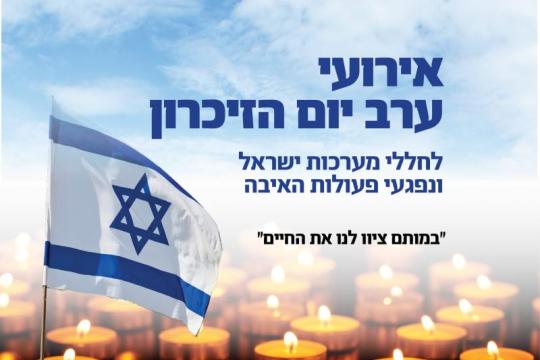
On this Erev Yom Ha'Shoah, I'd like to share with you some data, published on Thursday by Israel's Central Bureau for Statistics (source in Hebrew).
The number of Jews worldwide is 15.7 million, still lower than it was in 1939, before the Holocaust, 85 years ago (that is what a genocide looks like demographically).
7.1 million Jews live in Israel (45% of world Jewry) 6.3 million Jews live in the US (40% of world Jewry)
Here's the data for the top 9 Jewish communities in the world:
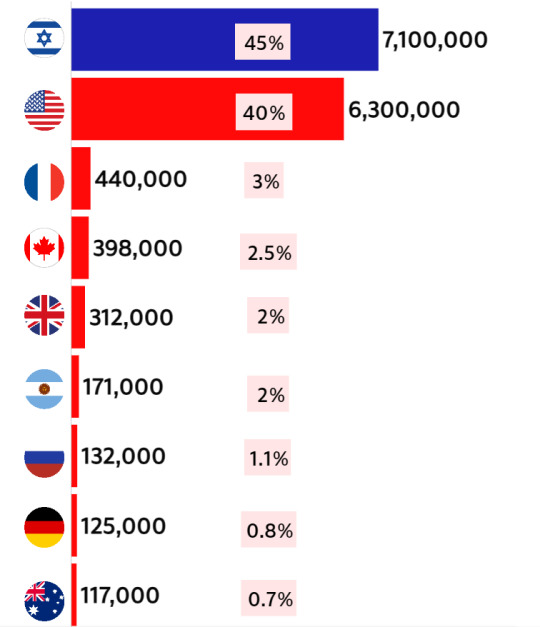
There are about 133,000 Holocaust survivors currently living in Israel. Most (80%) live in big cities in central Israel. Around 1,500 are still evacuated from their homes in northern and southern Israel due to the war (back in January, on International Holocaust Remembrance Day, there was a report about 1,894 survivors who also became internal refugees due to the war. Source in Hebrew). One Holocaust survivor, 86 years old Shlomo Mansour, is still held hostage in Gaza. He survived the Farhud in Iraq.
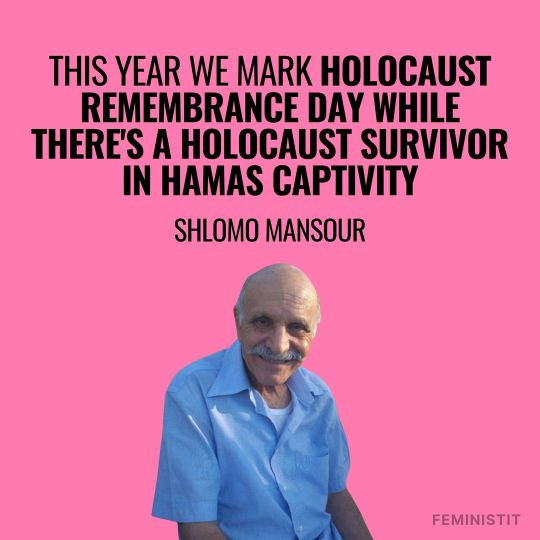
I haven't seen any official number for how many survivors had been slaughtered as a part of Hamas' massacre, despite everyone here being aware that Holocaust survivors had been murdered on Oct 7, such as 91 years old Moshe Ridler. Maybe, as we're still discovering that some people thought to have been kidnapped during the massacre, were actually killed on that day, no one wants to give a "final" number while Shlomo has not yet been returned alive.
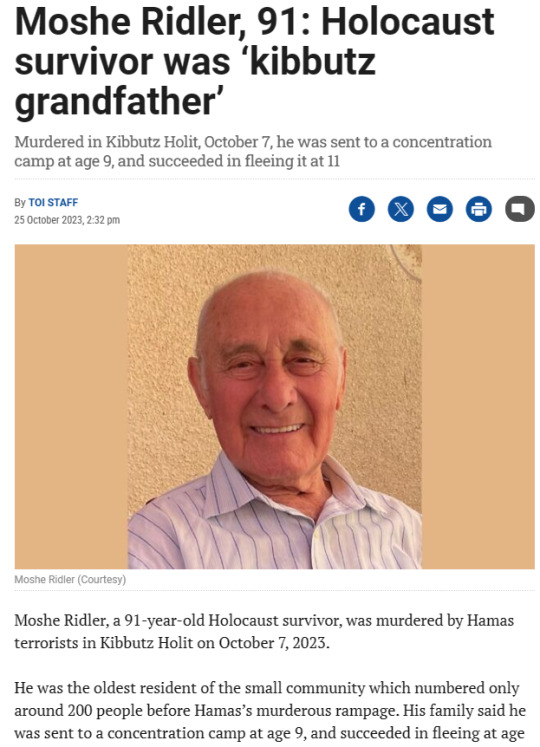
Out of all Israeli Holocaust survivors, 61.1% were born in Europe (35.8% in the countries of the former Soviet Union, 10.8% in Romania, 4.9% in Poland, 2.9% in Bulgaria, 1.5% in Germany and Austria, 1.3% in Hungary, 4.2% in the rest of Europe), 36.6% were born in Asia or Africa (16.5% in Morocco, 10.9% in Iraq, 4% in Tunisia, 2.6% in Libya, 2.1% in Algeria, 0.5% in other Asian and African countries) and 2.3% were born elsewhere.
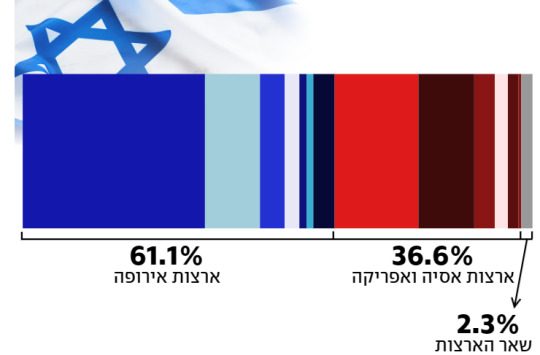
Out of all Holocaust survivors in Israel, 6.2% managed to make it here before the establishment of the state, despite the British Mandate's immigration policy against it (up until May 13, 1948). 30.5% made it to Israel during its very first years (May 14, 1948 until 1951), another 29.8% arrived in the following decades (1952-1989), and 33.5% made Aliyah once the Soviet Union collapsed, and Jewish immigration to the west (which included Israel) was no longer prohibited by the Soviet regimes (1990 on).
The second biggest community of survivors in the world is in the US, the third biggest (but second biggest relative to the size of the population) is in Australia. I heard from many Holocaust survivors who chose to immigrate there that they wanted to get "as physically far away from Europe as possible."
For a few years now, there's been this project in Israel, called Maalim Zikaron, מעלים זיכרון (uploading memory. Here's the project's site in Hebrew. In English it's called Sharing Memories, and here's the English version of the site) where Israeli celebs are asked to meet up with a Holocaust survivor (it's done in Hebrew), and share the survivor's story and the meeting on their social media on Erev Yom Ha'Shoah (which is today). Each year, there's also one non-Israeli Jewish celeb asked to participate (in English. This time around it's Michael Rapaport, he's meeting Aliza, an 81 years old survivor from the Netherlands, who was hidden along with 9 other Jewish babies for two years. He uploaded a preview of his meeting with her here, where he asked her what it means to her to be a Jew, and from what I understand, he will upload more today to the same IG account). This year, there will be an emphasis on Holocaust survivors who also survived Oct 7 (with 6 of the 20 participating survivors having survived Hamas as well). Here's a small bit from an interview with one such survivor, 90 years old Daniel Luz from kibbutz Be'eri:
(for all of my updates and ask replies regarding Israel, click here)
#israel#antisemitism#israeli#israel news#israel under attack#israel under fire#terrorism#anti terrorism#hamas#antisemitic#antisemites#jews#jew#judaism#jumblr#frumblr#jewish#israelunderattack#shoah#holocaust
467 notes
·
View notes
Text
Today is January 27th, which is International Holocaust Remembrance Day, and I'd like to get some stuff off my chest.
First, I'd like to take a minute to point out that it is not Yom HaShoah, which is the day Israel (and by extension large portions of the Jewish diaspora population) uses as Holocaust Remembrance day. Yom HaShoah is on the 27th of Nisan, a date that was selected to commemorate the Warsaw Ghetto Uprising, centering Jewish resistance in our own story. That date was selected nearly five decades before the UN picked January 27th, which was selected to center our white saviors who came to liberate Auschwitz. This is utter bullshit. And no excuses for not being able to handle a moving date on the Gregorian calendar - April 19th would be the Gregorian equivalent, and it was not selected.
Having said that, given how many infographics I've seen over the last four months about how people are increasingly denying or doubting the Holocaust, I figure any day that acknowledges it is a good thing, so yeah, let's take two days to remember. I think it's worth it.
So given that this is the Holocaust Remembrance Day that centers our goyishe friends, let's talk about how our goyishe friends should observe the day.
1. It is likely that you never learned a lot of details about the Holocaust. Holocaust education usually boils down to, "and the Nazis put Jews in camps in order to kill them, and a lot of Jews were killed in gas chambers, and about 6 million died in all." Go learn some details. Read or watch an account from a survivor. Learn about the medical experiments, or the death marches. Learn some details about what the gas chambers were actually like. Try to understand the horror. Learn about the SS St. Louis or the Evian conference in 1938 where almost every country on Earth decided it was better to let the Jews die in Germany than to allow them into their own countries.
2. On that note, take the time to understand that anti-semitism neither began nor ended with the Nazis, and that even the "good guys" were incredibly antisemitic.Try to recognize that the antisemitism that was present where you live right now in the 1930s didn't just disappear, it just went into hiding. Think about where it might be hiding now.
Basically, because this is the Holocaust Remembrance Day for the goyim, I want to focus our remembrance of what happened on the goyim. What did they do? What could they have done to help? Why didn't they? We can come back in May for more Jewish focused learning, but the Holocaust could not have happened without A LOT of willing goyim, and I think we should spend the day remembering them and their actions.
And as a side note: if you happen to read this and you've chosen to spend the day engaging in Holocaust denial or Holocaust inversion, then know that my hope for you is that something happens in your life to teach you empathy and basic human decency. And I hope it isn't pleasant for you.
#holocaust remembrance day#antisemitism#I am expecting social media to be a NIGHTMARE today#it's going to be holocaust inversion all day long#and I'm not going to be surprised by it#but I am going to be infuriated#my hope is that this post reaches one person sometime in the future when the left has moved on to some other thing to be outraged about#and that it triggers growth in them - makes them take a minute to learn something about history#but I don't think that 2024 is gonna be the year for that#the jews are tired
448 notes
·
View notes
Text
Today in History: Today is Monday, Jan. 27, the 27th day of 2025.
On this day: In 1996, Germany celebrates its 1st Holocaust Remembrance Day.
By The Associated Press Today in history: On Jan. 27, 1945, during World War II, Soviet troops liberated the Nazi concentration camps Auschwitz and Birkenau in Poland. Also on this date: In 1756, composer Wolfgang Amadeus Mozart was born in Salzburg, Austria. In 1880, Thomas Edison received a patent for his electric incandescent lamp. In 1967, astronauts Virgil I. “Gus” Grissom, Edward H.…
2 notes
·
View notes
Text
When Steven Spielberg first showed John Williams (the composer of the film) a cut of this film, Williams was so moved he had to take a walk outside for several minutes to collect himself.
Upon his return, he told Spielberg he deserved a better composer.
Spielberg replied, "I know, but they're all dead."
Today commemorate International Holocaust Remembrance Day. The Holocaust is the name given to the systematic murder of six million Jews by the Nazi regime during the Second World War.
The date marks the anniversary of the liberation of the concentration camp at Auschwitz on 27th January 1945. Auschwitz was liberated by soldiers of the 100th Infantry Division and the 60th Army of the 1st Ukrainian Front. What greeted them as they entered the gates of the largest of Auschwitz's three main camps, Birkenau, was a vision of hell.
For the dead, and the living, we must bear witness. We remember and we must never forget. Never again! 🕯️
#InternationalHolocaustRemembranceDay #HolocaustMemorialDay #Filmsguild #WWII #Schindler'sList #JohnWilliams #LiamNeeson #BenKingsley
Schindler's List (1993) 🎥
27th January 2024
3 notes
·
View notes
Video
youtube
https://www.youtube.com/watch?v=RAuawJT7-Io
Tisha b’Av is coming up. The Ninth (day) of (the Hebrew month) Av is a day of . . . . well, of lamentations. The Book of Lamentations, Eicha, is read, and people fast and treat the day as a day of mourning. The mourning is for all of the death and persecution and massacre that has befallen the Jewish people over the course of history, of which there is quite a bit. There’s even quite a lot of verifiably dated crap that befell the Jews on or around Tisha b’Av, including expulsions from England (1209), France (1306), and Spain (1492), Heinrich Himmler receiving authorization for the Final Solution (1941), the first deportations from the Warsaw Ghetto to Treblinka (1942), the AMIA bombing in Buenos Aires (1994), and a few other events. So there’s a fair amount to mourn.
One of the things that happens during Tisha b’Av is the singing of various dirges called kinnot about the sad state in which the Jews find themselves. This is one of them, traditionally sung on the morning of Tisha b’Av. The composer is Boruch Schorr, a 19th-century hazzan from Lemberg, which we know today as the city of Lviv, a place that is itself no stranger to death and persecution and massacre.
Also, I should point out that we do have in our holiday cycle a whole day devoted exclusively to mourning the collective mountain of misfortune that the world has heaped upon the Jewish people, from antiquity to the present day . . . and yet, we also have an entirely separate day set aside for Holocaust remembrance. That should probably tell you something about the Holocaust, if even Tisha b’Av isn’t quite enough to contain that memory.
3 notes
·
View notes
Text
Today, we remember the Armenian Genocide (also known as the Armenian Holocaust), which was the systematic mass murder and expulsion of 1.5 million ethnic Armenians Christians carried out in Turkey and adjoining regions by the Muslim Ottoman government between 1894 and 1923. The starting date is conventionally held to be 24 April 1915, the day that Ottoman authorities rounded up, arrested, and deported from Constantinople (now Istanbul) to the region of Angora (Ankara), 235 to 270 Armenian Christian intellectuals and community leaders, the majority of whom were eventually murdered.
The genocide was carried out during and after World War I and implemented in two phases—the wholesale killing of the able-bodied male population through massacre and subjection of army conscripts to forced labour, followed by the deportation of women, children, the elderly, and the infirm on death marches leading to the Syrian Desert. Driven forward by military escorts, the deportees were deprived of food and water and subjected to periodic robbery, rape, and massacre. Most Armenian diaspora communities around the world came into being as a direct result of the genocide.
Other Christian ethnic groups were similarly targeted for extermination, including the Assyrian Christian genocide, in which as many as 300,00 native Christians, and the Greek Christian genocide in which as many as 750,00 Christians were murdered, and their treatment is considered by some historians to be part of the same genocidal policy.
The Armenian, Assyrian, and Greek Christian Genocide is acknowledged to have been one of the first modern genocides, because scholars point to the organized manner in which the killings were carried out. It is the second-most-studied case of genocide after the Holocaust.
Turkey denies that the word genocide is an accurate term for these crimes, but in recent years has been faced with increasing calls to recognize them as such. As of 2019, governments and parliaments of 32 countries, including the United States, Russia, and Germany, have recognized the events as a genocide.
On this Day of Remembrance, we should remember and pray for the martyrs and the refugees in Iraq, Egypt, Libya, and Syria. We should pray for the safety of the half a million Christians remaining in Syria, who are placed at risk because of religious persecution.
Almighty God, our Refuge and our Rock, your loving care knows no bounds and embraces all the peoples of the earth: Defend and protect those who fall victim to the forces of evil, and as we remember this day those who endured depredation and death because of who they were, not because of what they had done or failed to do, give us the courage to stand against hatred and oppression, and to seek the dignity and well-being of all for the sake of our Savior Jesus Christ, in whom you have reconciled the world to yourself; and who lives and reigns with you and the Holy Spirit, one God, now and forever. Amen.
A Prayer for Peace
Most holy God, the source of all good desires, all right judgments, and all just works: Give to us, your servants, that peace which the world cannot give, so that our minds may be fixed on the doing of your will, and that we, being delivered from the fear of all enemies, may live in peace and quietness; through the mercies of Christ Jesus our Savior. Amen.

#father troy beecham#christianity#jesus#saints#god#salvation#martyrs#faith#genocide#Armenia#Christian persecution
4 notes
·
View notes
Text
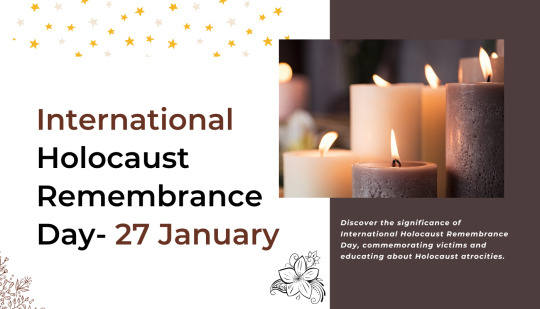
International Holocaust Remembrance Day- 27 January
Discover the significance of International Holocaust Remembrance Day, commemorating victims and educating about Holocaust atrocities.
January 27 marks International Holocaust Remembrance Day, a time for the global community to honor the victims and survivors of one of history’s darkest chapters.
As we approach this solemn occasion, it prompts deep reflection on its significance amidst current events, including the Israel-Hamas conflict, and how Holocaust remembrance intersects with the ongoing complexities in the Middle East.
Thomas Pegelow Kaplan, the Louis P. Singer Endowed Chair in Jewish History and an esteemed professor specializing in Holocaust studies, modern German-Jewish history, and histories of violence and language, shared his insights with CU Boulder Today.
He delved into the importance of International Holocaust Remembrance Day (IHRD), its rich historical context, and its profound impact on shaping collective memory.
What Is International Holocaust Remembrance Day?
Throughout the year, people worldwide observe various occasions to honor the victims of the Holocaust. In Israel, Yom HaShoah, the country’s official day of commemoration, was established by the Knesset (parliament) in 1951. Chosen to coincide with the start of the Warsaw ghetto uprising against the Nazis on the 27th of Nisan in 1943, this date falls in either April or May, following the Jewish lunar calendar.
In contrast, International Holocaust Remembrance Day has a more recent origin. Established by a resolution of the United Nations General Assembly in November 2005, this significant day, observed on January 27, commemorates the liberation of Auschwitz in 1945.
Why Did It Take 60 Years To Establish An International Day Of Recognition Of The Holocaust?
The evolution of Holocaust memory reflects a profound journey. In the early years of Israel’s existence, establishing a day to honor the lives lost and the resistance against the Nazis became a pivotal endeavor. This significance was underscored by the establishment of Yad Vashem, Israel’s official Holocaust memorial, in 1953.
However, in the 1950s, discussions about genocide in the United States often centered on Soviet crimes in the Baltics rather than the Holocaust. It wasn’t until the late 1970s that memory cultures began to shift, gradually recognizing the Holocaust’s unparalleled significance.
0 notes
Text
New Post has been published on Walks Beside Coaching & Consulting
New Post has been published on https://walksbesidecoaching.com/2023/06/are-you-a-pack-rat/
Are You a Pack Rat?
Do you look around your office or garage and see stacks of out-of-date magazines, unread books, boxes of history files, or just plain clutter? Is your professional excellence suffering because you can’t find the right data or documentation amid the office clutter?
‘Pack-ratting’ or hoarding is commonly seen in Elders that have survived the Great Depression, the Holocaust, prisoners of war, country wide famines, or other events where food or other basic survival elements were rationed or unable to be obtained. This response has created what we call the ‘scarcity mentality’. An example of the scarcity mentality is an Elder we know today keeps the pantry and freezer stocked so that he and his grandchildren will NEVER be hungry again.
Hoarding can also be demonstrated by anyone that has collected an excessive number of newspapers, magazines, old clothes, egg cartons, even the acquisition of cats and dogs. Frequently, we place a sentimental value on certain items as a remembrance of past ‘hey-days’, memories of loved ones that have passed away, a source of security even, a substitution for love. Often with an offer of assistance, these same ‘pack-ratters’ will welcome company to weed through the disproportionate heaps and remove the clutter.
If you think you may have become a ‘packrat’, ask yourself:
Are there other activities that you are not able to do by having all of the current clutter in place, such as, you can’t go camping because your old high school text books are stacked on top of the camper?
Are there stories or personal attachments to the articles in the clutter? How can you honor your personal history with these items and reduce them to a manageable few?
What are the feelings you associate with any of the stacks of possessions? Do you have the feeling of security with this amount of stuff around all the time?
Are you waiting on someone else to make decisions regarding the stacks of articles and they may have just forgotten about them? What requests do you need to make so that you regain some organization in your life?
How can you devise a workable timeline to remove, store, give to relatives, donate to worldwide missions, or even sell the articles? What outside resources will you need to contact for help?
0 notes
Text
Today (actually in the whole last week), for the Giornata della Memoria = Holocaust Remembrance Day, Italian Tv channels offer many shows to keep the awarness about what has been. For example:
-you can watch these videos and shows online on Raiplay and mediaset play (add in the search bar: "giornata della memoria"; you'll see appear other titles for other celebrations, look at the date). -Liliana Segre will talk from the Binario 21 in Milan live today (January 27th, 8:30 PM) on RaiUno. (ofc there are other planned live movies and shows, check the tv guides -guida tv- for both) -other private tvs as well offer contents but those are more difficult to be found online
Contents may be geoblocked where you live so I suggest you to use an Italian vpn. If you need more infos please feel free to send an ask
#giornata della memoria#it#italian#italiano#langblr#italian language#italian langblr#language#languages#parole words#traduzioni#italianblr#italian history#world history
14 notes
·
View notes
Text
Today it is 78 years ago that Auschwitz was liberated. For that reason, January 27th was named international Holocaust Rememberance Day by the UN. I’m a Dutch and German gentile, and I saw in the news a few days ago that according to a recent study a shocking 23% of Dutch people between the age of 18 and 40 believe that the Holocaust did not happen or that the generally accepted estimates of the number of deaths are exaggerated. https://nos.nl/artikel/2461149-minister-yesilgoz-geschokt-door-uitkomsten-onderzoek-naar-holocaust That’s bad. (If you are wondering about the methodology of the study- so was I. I personally do not know anyone who denies or doubts the Holocaust and had a hard time believing almost a quarter of people my age in my country did. There is a link in the news article that shows more details about the methodology, and it looks sound to me) But- there also was a huge approval among the respondents of more holocaust education. So I thought, let’s be tumblr and post about it, and add in some contemporary antifascism for good measure. I’ll list several resources here that focus on the Netherlands and Germany because those are the ones I am the most familiar with. Some of them are available in English. I hope you find them useful. General: https://www.yadvashem.org/ Yad Vashem is probably the most well-known Holocaust remembrance center in the world, their website is extensive. https://twitter.com/AuschwitzMuseum The Auschwitz Museum twitter posts the names and, if available, pictures, of holocaust victims on the day of their birthday. Dutch: https://www.annefrank.org/nl/ The Anne Frank Stichting is in charge of the Anne Frank house in Amsterdam, and organizes many educational events for all age groups. They have an amazing range of resources on their websites that anyone can learn a lot from. The most up to date resources are in Dutch. A bit hidden under ‘over ons’ and then ‘onderzoek’ is also some of the most comprehensive research I know of about contemporary Antsemitism, Racism, and the Far Right in the Netherlands. https://kampwesterbork.nl/
Website of the commemoration site camp Westerbork. Full of information about the history of the camp and the persecution of Jews in the Netherlands during WWII. Available in Dutch, German and English https://kafka.nl/ Onderzoeksgroep Kafka is an antifascist information website and twitter account that tries to keep on top of the far right in the Netherlands. It seems like their website has not been updated in a while, but their twitter account is updated more regularly German: https://www.ndr.de/geschichte/chronologie/Holocaust-NS-Voelkermord-an-den-Juden,verbrechen100.html A collection of articles and items about the Holocaust by the public broadcaster, from many different angles. https://www.buchenwald.de/nc/896/ Website of the Buchenwald concentration camp with detailed information - also available in English and French
https://www.mauthausen-memorial.org/de Website of the Mauthausen concentration camp, the website architecture is old but still updated regularly, and has many links to other valuable resources - also available in several other languages https://www.belltower.news/ Belltower news is an antifascist website which tracks the contemporary far right and antisemitism. Some articles available in English. This list is of course by now means exhaustive. Please add on more links if you have them!
4 notes
·
View notes
Text
January 27th is International Holocaust Remembrance Day
Today commemorates the victims of the Holocaust by Nazi Germany - January 27th was specifically chosen as the date because it’s the anniversary of Auschwitz-Birkenau’s liberation. Six million Jews were murdered by the regime, and millions of Romani people, disabled people, political dissidents, and LGBTQ people.
Understanding Holocaust-related history is important as queer history - prior to the Nazi rise to power, Germany was arguably the most queer-friendly country in the world and was home to both Magnus Hirschfeld and the Institut für Sexualwissenschaft before they burned it down.
It’s also important because antisemitism and racial purity/white supremacy are so engrained in American society - people weren’t just being “dumb libs” when they were comparing Trump’s rise to power to previous fascist powers. The Nazis became *increasingly* radical after years of enacting propaganda, discriminatory laws, and organized violence before reaching genocide. This includes the Nuremberg Race Laws (which claimed only those of “German or kindred blood” could be German citizens and banned “race defilement” relationships and marriages), organized public identification and exclusion (such as the Star of David badge, boycotts, public humiliation, etc.), organized violence like Kristallnacht, displacement (often through forced emigration, resettlement, expulsion, deportation, and ghettoization), enforced theft/confiscation of property and belongings, and forced labor.
Int. Holocaust Remembrance Day serves to remember those lost to the Nazi regime and promote its education so future genocides can be avoided. Out of all of the things I listed that led up prior to mass genocide, think about how many still take place today - the constant displacement of Native Americans, redlining to keep Black and Brown communities in poverty, state-sanctioned violence through police brutality, the concentration-like camps by ICE and immigration policy, and so much more.
#lgbtq#lgbt#social justice#holocaust#holocaust remembrance day#jewish#queer history#anti facist#fuck nazis#human rights#antisemitism#white supremism#WWII#racial justice#black lives matter#blm
45 notes
·
View notes
Note
people using Yom HaShoah as a reason to not get tommy's birthday trending is so gross to me, especially once I figured out what it was.
according to wikipedia, it is,
"...known colloquially in Israel and abroad as Yom HaShoah (יום השואה) and in English as Holocaust Remembrance Day, or Holocaust Day, is observed as Israel's day of commemoration for the approximately six million Jews who perished in the Holocaust as a result of the actions carried out by Nazi Germany and its collaborators, and for the Jewish resistance in that period. In Israel, it is a national memorial day."
why would you shit on people trending tommy's birthday instead of simply, I don't know, talking about this important day instead? why not light a candle for the victims? why not read up about the holocaust? why are you yelling at teenagers on the internet for wishing someone a happy birthday? who's to say that they even knew that this was today, because the date of the holiday isn't the same every year?
I don't know. it just seems scummy to me that people are more upset about tommy trending than the actual day itself.
performative activism falls into two traps when it taken to the extreme: - targeted harassment over extremely minor offenses, either intentionally or otherwise - the trivialization of genuinely important cultures/events/problems/etc for the sake of bringing attention to an issue that is ultimately boneless or unimportant, either for the sake of the performance or as an excuse for their actions which tommy antis have managed to do both of
34 notes
·
View notes
Text
Today is Yom HaShoah, which is Israel’s (and by extension large portions of the Jewish diaspora’s) Holocaust Remembrance Day. Back in January, I wrote this post for International Holocaust Remembrance Day, in which I basically said that I thought that International Holocaust Remembrance Day really should line up with Yom HaShoah, but that I choose to take the “Holy shit! Two cakes!” attitude towards it, because the Holocaust is certainly a large enough tragedy to support two remembrance days.
The one in January’s date was selected to be in remembrance of the day Auschwitz was liberated. Because that date was selected to celebrate a non-Jewish achievement, I think it should be a day for the goyim to focus on how they can do better. If it is in remembrance of what good allies they were, then it should be used as a day to do some learning and reflection in order to be better allies to us now, in the present.
But the one today is timed to commemorate the Warsaw Ghetto uprising. Yom HaShoah is the day we picked not just to remember the 6 million who died, but also the ones who decided to die fighting. It is a day to remember that we must stand up for ourselves, even if the price is high, because the price for not standing up for ourselves is higher.
In January I gave some topics for goyim to think about in remembrance of the day. Because today is the Jewish remembrance day, I will share what I am thinking about today as a Jew, and invite others to think about it too.
I saw a post a few days ago where someone commented on a different post about why Jews didn’t leave Germany after Kristallnacht, and how moving to another country because some people broke your window feels like an overreaction. And that you will always be overreacting until it’s too late. How do we know the difference between “just” broken windows and a sign to flee? Knowing antisemitism is on the rise globally, where would we even flee to? How do I help my children avoid the fate of their great-grandfather (who survived) or their great-great-grandfather (who did not)?
We picked this day to commemorate the Jewish victims of the Holocaust, but also to remember that even in the middle of one of the worst attacks on our people (and that’s fucking saying something) there were Jews who stood up and refused to accept their fate. I have seen many Jews say that they’re getting “1930s Germany” vibes from current events. If things are headed in the same direction, what can we do to fight our fate? Ideally with words now, so that we don’t have to fight with pistols and homemade explosives like they did in Warsaw.
The reason for a remembrance day like today is to acknowledge the past, but also to learn from it. What can we learn so that when we say, “We will outlive them” we can mean all of us, not just the ones who are lucky enough to be geographically removed from the worst of it, or to survive despite the odds?
This is a little more downbeat than I had hoped, which is unsurprising given the nature of the day. I like to try to stay positive though, so I’ll say this: Six million people were murdered. The Warsaw Ghetto uprising did not succeed in its goal of liberation. But the Nazis did not succeed in their goal of eliminating the Jews either. We did outlive them. We are still here to remember.
Am Yisrael Chai
143 notes
·
View notes
Link

Today is International Holocaust Remembrance Day. Each year on January 27, the date of the liberation of Auschwitz-Birkenau, the world remembers the millions of victims of the Holocaust. The National Archives and Records Administration and U.S. Holocaust Memorial Museum have compiled education resources on the Holocaust. Click the link to learn more.
(Image: President and Mrs. Nixon paying their respects at the Eternal Flame in the Hall of Remembrance at the Yad Vashem - The World Holocaust Remembrance Center in Jerusalem, 6/17/1974. WHPO-E3077-26)
9 notes
·
View notes
Text
Today, 27 January, is International Holocaust Remembrance Day. To mark this date, members of our staff have lit a candle to remember the 10,000 Jewish Frankfurters deported between 1941 and 1945 from the Großmarkthalle, which is now part of the ECB’s premises. May their memory be a blessing. A memorial marks the deportation site in and around the Großmarkthalle. To learn more about the site’s history, watch the film on the memorial by the Jewish Museum Frankfurt: https://lnkd.in/epc2UYw

February 27 2021
4 notes
·
View notes